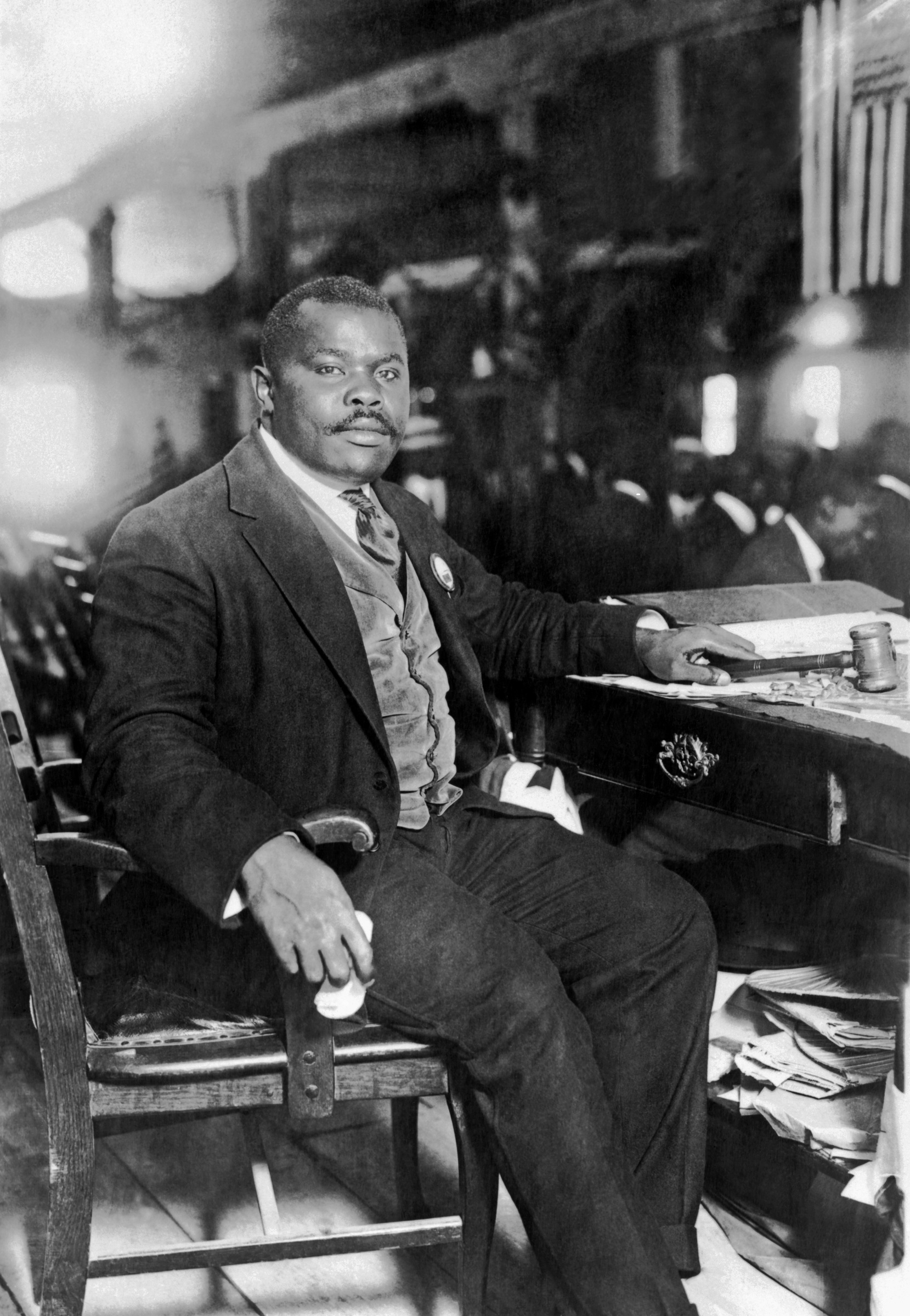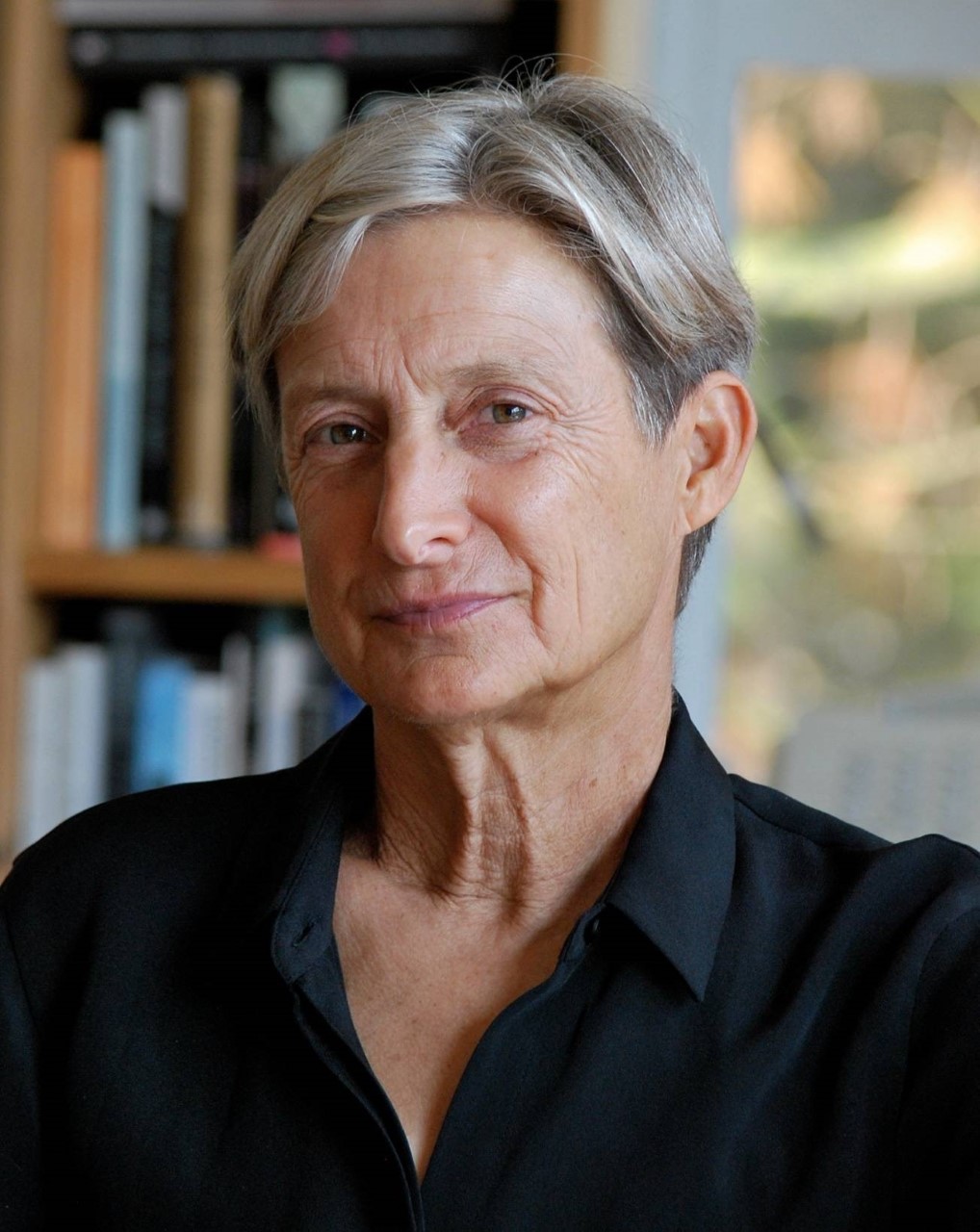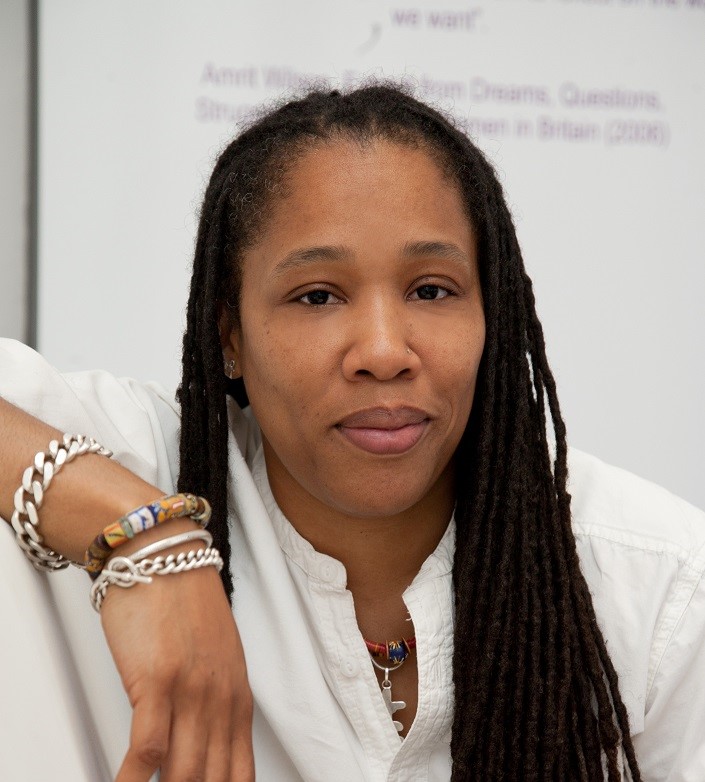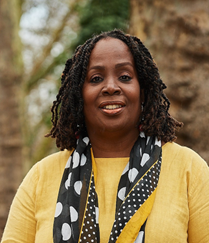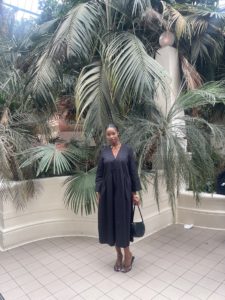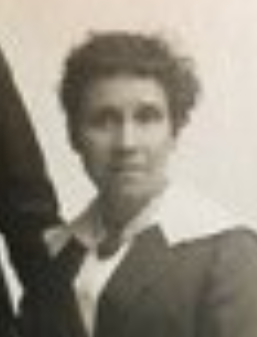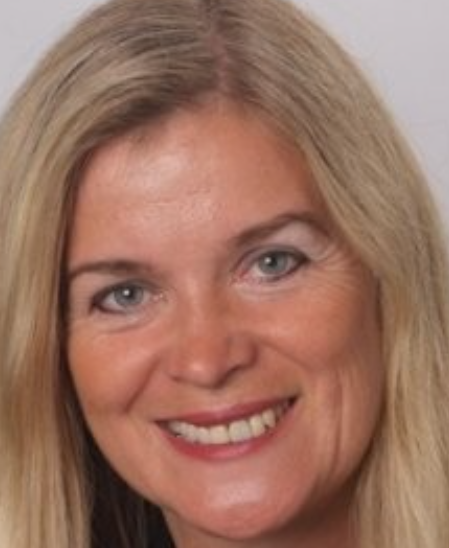Zhuoxin Han is a second year LLB Law student. In this blog they share their experience of attending the Lunar New Year event held by the university. 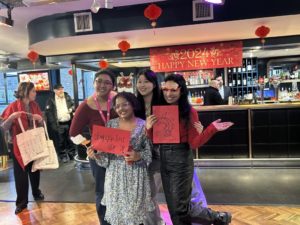 The Lunar New Year is the most important festival celebrated by many countries in Asia. The influence of the Spring Festival has been spreading worldwide; for instance, Canada, Australia, New Zealand, South Africa, the UK, and the US have begun to join in this celebration. You may have noticed the huge number of red lanterns and decorations in London’s Chinatown if you happened to pass by recently. Or maybe the red celebration signs on the street -screens, as well as dragon illustrations on newspapers or magazines? The Evening Standard, for instance, printed a super cool red dragon as its cover on 10th Feb.
The Lunar New Year is the most important festival celebrated by many countries in Asia. The influence of the Spring Festival has been spreading worldwide; for instance, Canada, Australia, New Zealand, South Africa, the UK, and the US have begun to join in this celebration. You may have noticed the huge number of red lanterns and decorations in London’s Chinatown if you happened to pass by recently. Or maybe the red celebration signs on the street -screens, as well as dragon illustrations on newspapers or magazines? The Evening Standard, for instance, printed a super cool red dragon as its cover on 10th Feb.
The Lunar New Year is associated with old myths and traditional customs. Every family undergoes a thorough cleaning while approaching the new year, meaning they are ready to sweep out bad things or moods and be ready to accept the incoming good fortune. In the past, people would practice calligraphy and write their own versions of couplets; today people tend to purchase ready-made couplets. Another custom is using red paper cut outs and couplets to decorate windows and doors respectively. These pretty ornaments make people feel content and joyful.
This year, the Lunar New Year event was jointly held by Birkbeck Global Recruitment Team and La Yong Jackson, from the International Student Administration team. As student Ambassadors, Ziyao and I were appointed to assist this event.
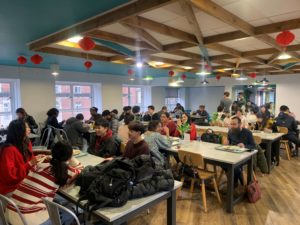 Before Birkbeck participants arrived, our team members cleaned and decorated the locations where the celebrations were due to take place in the main Malet Street building, the Canteen on the fifth floor, and the George Birkbeck Bar on the fourth floor. We also managed to create a ‘photo corner’ for guests who wish to take pictures, using our phones or Polaroid instant cameras provided by staff for everyone to use.
Before Birkbeck participants arrived, our team members cleaned and decorated the locations where the celebrations were due to take place in the main Malet Street building, the Canteen on the fifth floor, and the George Birkbeck Bar on the fourth floor. We also managed to create a ‘photo corner’ for guests who wish to take pictures, using our phones or Polaroid instant cameras provided by staff for everyone to use.
The most popular custom during the Spring Festival must be the Red Pocket! The bright red reminds people of the warmth of family, the way everyone once gathered around, talking at the fireplace. I’ve sometimes wondered if that’s why Santa’s hats are red. 😊
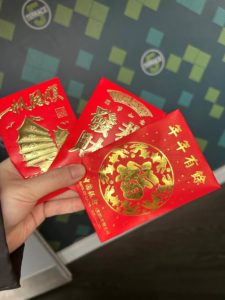 This year, Birkbeck prepared red pockets containing a free lunch voucher, golden chocolate, plus a delicate Birkbeck College badge for everyone who registered for the celebrations. As an international student, I found myself impressed by all these thoughtful details. It was probably a time-consuming task to prepare, and felt special. I was also impressed by the canteen staff, who had a really busy day, preparing food for both the regular daily menus and also the extra Asian cuisines for our celebrations. Sammie, Yunmeng, Ziyao, and I helped with guest check-in; everyone looked surprised and happy when they received the red pocket. It was nice to witness their genuine smiles. After lunch in the canteen, we moved to the George Birkbeck Bar.
This year, Birkbeck prepared red pockets containing a free lunch voucher, golden chocolate, plus a delicate Birkbeck College badge for everyone who registered for the celebrations. As an international student, I found myself impressed by all these thoughtful details. It was probably a time-consuming task to prepare, and felt special. I was also impressed by the canteen staff, who had a really busy day, preparing food for both the regular daily menus and also the extra Asian cuisines for our celebrations. Sammie, Yunmeng, Ziyao, and I helped with guest check-in; everyone looked surprised and happy when they received the red pocket. It was nice to witness their genuine smiles. After lunch in the canteen, we moved to the George Birkbeck Bar.
Here we enjoyed three main activities: red paper cutting with traditional calligraphy or painting, voting for the best dresser and finally a quiz with prizes to be won! One girl drew a vivid dragon and received compliments with people taking pictures of her painting, and she even won a prize for it. Another lady who dressed in a traditional long dress with a beautiful pearl necklace won the best-dressed prize. She looked surprised when she received the award and gave a big, charming smile.
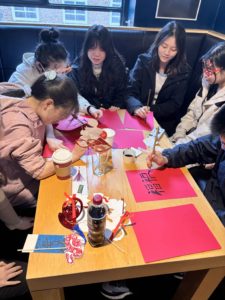 The quiz session was exciting; questions were related to customs and special products of different countries. It was a well-balanced quiz that included single choice, multiple choice, and matching. Each question had a strict time limitation which added to the excitement; everyone was holding their breath. When the results were released, I was a bit shocked to realise I had won! To be honest, I had guessed some of my answers! My colleague was searching for the mysterious winner: Han, which is my shortened nickname. She moved through the room super-fast, and I was chasing her, trying to explain that I was the one she was looking for. Finally, she turned around and noticed me chasing her, which made everyone laugh. There were two others who had come in with high scores, so as the three winners we gathered and had our picture taken. After this, lots of students stayed longer to socialize with each other, and we took lots of photos to remember the happy memories!
The quiz session was exciting; questions were related to customs and special products of different countries. It was a well-balanced quiz that included single choice, multiple choice, and matching. Each question had a strict time limitation which added to the excitement; everyone was holding their breath. When the results were released, I was a bit shocked to realise I had won! To be honest, I had guessed some of my answers! My colleague was searching for the mysterious winner: Han, which is my shortened nickname. She moved through the room super-fast, and I was chasing her, trying to explain that I was the one she was looking for. Finally, she turned around and noticed me chasing her, which made everyone laugh. There were two others who had come in with high scores, so as the three winners we gathered and had our picture taken. After this, lots of students stayed longer to socialize with each other, and we took lots of photos to remember the happy memories!
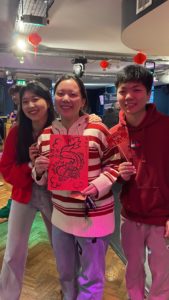 The Lunar New Year marks the end of the cold, dark winter and celebrates the beginning of a hopeful spring; it is a symbol of the final rest after a busy or tiring year; a chance to reunite with family members and recharge energy. People use this opportunity to catch up with those dear to them, preparing and getting ready for the next following year. This event which created a sense of community and togetherness, really helped capture these feelings.
The Lunar New Year marks the end of the cold, dark winter and celebrates the beginning of a hopeful spring; it is a symbol of the final rest after a busy or tiring year; a chance to reunite with family members and recharge energy. People use this opportunity to catch up with those dear to them, preparing and getting ready for the next following year. This event which created a sense of community and togetherness, really helped capture these feelings.
As a final note from me, I wish you all a happy Lunar New Year! May the Year of the Dragon bring you good fortune!
龙年吉祥!1 龍年吉祥!2
Below is a list of well wishes for the lunar new year in a variety of languages, so feel free to spread the well wishes in your own language!
Albanian: Le të sjellë Viti i Drakonit fat për ty!
Arabic: “مهما جلب عام التنين لك من الحظ السعيد!” (mahma jalaba ‘aam altinin lak min alhaz alsaeid)
Bengali: “ড্রাগন বছর তোমার ভাগ্য আনুক!” (Ḍrāgana bôshara tōmāra bhāgya ānuka!)
Bosnian: “Neka godina Zmaja donese sreću tebi!” (same as Croatian)
Croatian: “Neka godina Zmaja donese sreću tebi!”
Czech: “Ať ti Rok Draka přinese štěstí!”
Danish: “Må Drageåret bringe dig held og lykke!”
Dutch: “Moge het Jaar van de Draak je geluk brengen!”
Estonian: “Loota, et Draakoni aasta toob sulle õnne!”
Filipino: “Sana’y magdala ng suwerte sa’yo ang Taon ng Dragon!”
Finnish: “Toivotan sinulle onnea Lohikäärmeen vuonna!”
French: “Que l’Année du Dragon vous apporte bonne chance!”
German: “Möge das Jahr des Drachen Ihnen Glück bringen!”
Greek: “Ας φέρει το Έτος του Δράκου καλή τύχη σε εσένα!” (As férei to Étos tou Drákou kalí týchi se eséna!)
Hebrew: “שנת הדרקון תביא לך מזל טוב!” (Shnat hadrakon tavi lecha mazal tov!)
Hindi: “ड्रैगन का वर्ष आपको शुभकामनाएं लेकर आए!” (ḍragan kā varṣ āpako śubhakāmanāeṁ lekar āe!)
Hungarian: “A Sárkány Éve hozzon neked szerencsét!”
Icelandic: “Má Drakársárinn koma þér heppni!”
Indonesian: “Semoga Tahun Naga membawa keberuntungan bagi Anda!”
Italian: “Che l’Anno del Drago ti porti fortuna!”
Japanese: “龍の年があなたに幸運をもたらしますように!” (Ryū no toshi ga anata ni kōun o motarashimasu yō ni!)
Korean: “용년이 당신에게 행운을 가져다 주기를 바랍니다!” (Yongnyeoni dangsinege haeng-un-eul gajyeoda jugireul barabnida!)
Kurdish: “Salê Şahmaran ji we re şans bidin!”
Latvian: “Lai Drakona Gads atnes tev veiksmi!”
Lithuanian: “Tegul Drakono metai tau atneš laimę!”
Malay: “Semoga Tahun Naga membawa keberuntungan kepada anda!”
Nepali: “ड्र्यागनको वर्ष तपाईंलाई भाग्य ल्याउनुहोस्!” (Ḍr’yāganakō varṣa tapā’īnlā’ī bhāgya lyā’unuhōs!)
Polish: “Niech Rok Smoka przyniesie ci szczęście!”
Portuguese: “Que o Ano do Dragão traga boa sorte para você!”
Romanian: “Anul Dragonului să îți aducă noroc!”
Russian: “Пусть год Дракона принесет вам удачу!”
Serbian: “Neka godina Zmaja donese sreću tebi!” (same as Croatian)
Spanish: “¡Que el Año del Dragón te traiga buena suerte!”
Swahili: “Mwaka wa Joka ulete bahati njema kwako!”
Swedish: “Må Drakens år bringa dig lycka!”
Thai: “ขอให้ปีมังกรนำโชคดีมาหาคุณ!” (kh̄ xih̄ pī mạngkrnăm chŏkh dī mā h̄ā khun!)
Turkish: “Ejderha Yılı size şans getirsin!”
Ukrainian: “Нехай Рік Дракона принесе вам щастя!” (Nekhay Rik Drakona prynese vam shchastya!)
Vietnamese: “Chúc năm Rồng mang lại may mắn cho bạn!”
More Information:
- Find out more about being an International Student at Birkbeck
- If you have any questions about how to become an international student at Birkbeck contact globalrecruitment@bbk.ac.uk

